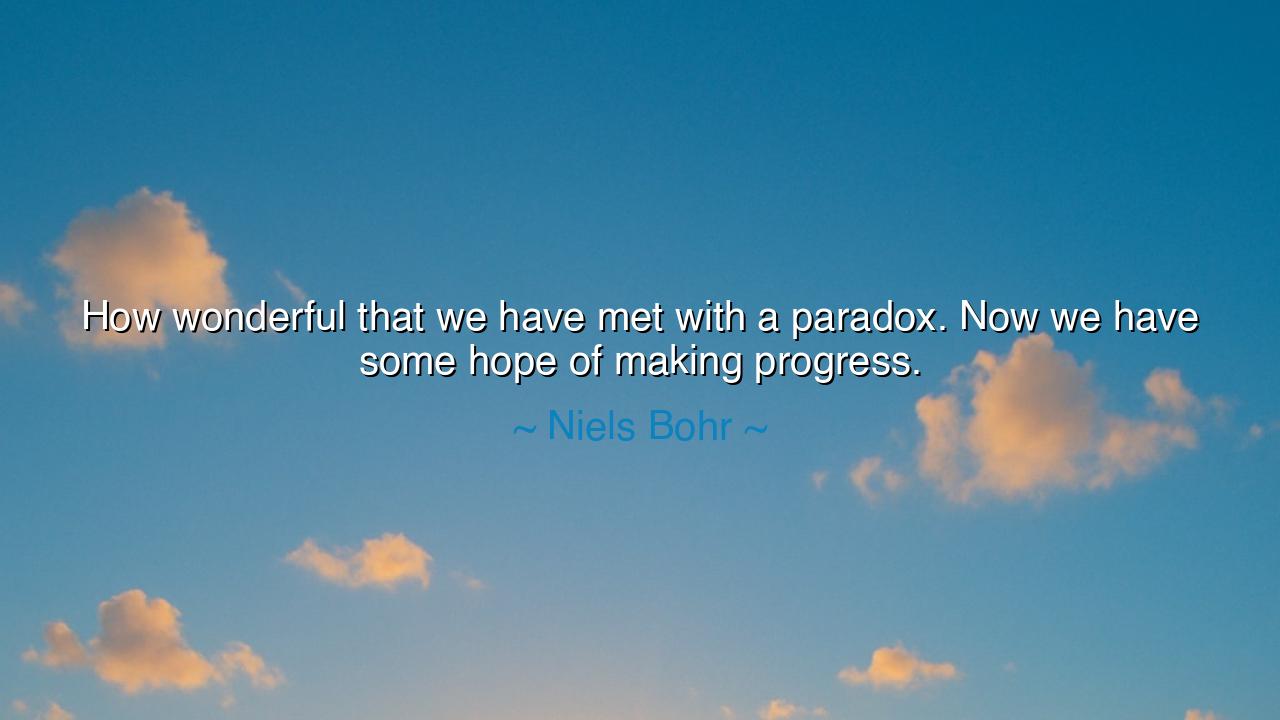
How wonderful that we have met with a paradox. Now we have some
How wonderful that we have met with a paradox. Now we have some hope of making progress.






“How wonderful that we have met with a paradox. Now we have some hope of making progress.” Thus spoke Niels Bohr, the great physicist and philosopher of the atom, whose mind bridged the worlds of matter and mystery. To the common ear, his words sound strange—for how can contradiction be a cause for hope? Yet in this paradox itself lies the essence of wisdom. For Bohr knew that the paradox is not a wall but a doorway—a moment when the limits of understanding crack, allowing the light of deeper truth to shine through.
In the ancient manner, let us recall that every age has trembled before its own paradoxes. The philosophers of old—Heraclitus, Lao Tzu, and Socrates—each spoke in riddles because truth itself is woven from opposites. Heraclitus taught that “the way up and the way down are one and the same,” and Lao Tzu declared that “to yield is to be strong.” They saw what Bohr saw centuries later in the quantum world: that reality is not simple, that it holds contradictions not as errors but as the secret rhythm of existence. To meet with paradox, then, is to stand upon the edge of revelation—to glimpse the divine complexity beneath the surface of what we think we know.
When Bohr first beheld the strange behavior of electrons, he found that the universe mocked the logic of men. Light behaved both as a wave and a particle, two natures in one form—something impossible by reason, yet undeniable by observation. Many scientists resisted this contradiction; they sought to crush it beneath the hammer of certainty. But Bohr, with the humility of a true seeker, did not flee the paradox—he embraced it. He saw that truth is not destroyed by contradiction, but expanded by it. Thus he founded the principle of complementarity, which teaches that opposites may both be true, depending on how one looks. This was not the defeat of reason—it was its evolution.
The meaning of Bohr’s words reaches far beyond science. In life, too, we meet paradoxes at every turn. We discover that love and pain dwell in the same heart, that strength grows through weakness, that loss teaches the meaning of abundance. These contradictions confuse the unwise, but they enlighten the awakened. When the soul encounters a paradox, it stands before the threshold of transformation. To deny it is to cling to ignorance; to accept it is to step into wisdom. For as long as we live within the realm of easy answers, we make no progress. Only when the old truths shatter, when the clear water of certainty turns turbulent, do we begin to see what lies beneath.
Consider the life of Galileo Galilei, who looked through his telescope and found the heavens moving not around the Earth but the Sun. His discovery was a paradox—the world inverted, the center displaced. The old order called him heretic, but the paradox he revealed opened the door to a new cosmos. He suffered for truth, yet his willingness to confront contradiction changed the course of human thought. So it has ever been: from paradox comes progress, from doubt comes discovery, from humility before mystery comes the ascent of understanding.
The wise do not fear paradox; they welcome it as the voice of truth whispering from beyond reason’s horizon. For to live is to dwell within contradictions—between youth and age, joy and sorrow, creation and decay. The fool demands that one side vanish; the sage learns to hold both in his hands, trembling but unbroken. As Bohr taught through science, and the ancients through spirit, only when opposites meet in harmony does the music of truth resound.
And so, the lesson for us, my listeners, is this: when you meet a paradox in your life—when what you know no longer explains what you feel—do not despair. Rejoice. You stand where Bohr stood, where every thinker and seeker before you has stood: at the brink of greater knowing. Do not rush to resolve the contradiction; let it speak. Let the tension between opposites sharpen your mind and widen your heart. Seek not comfort in certainty but courage in curiosity.
For it is only through paradox that wisdom grows, only through doubt that faith deepens, only through confusion that clarity is born. When you next find yourself lost between two truths, remember Bohr’s words: “How wonderful that we have met with a paradox.” For it means the universe has invited you to ascend another step upon the spiral of understanding—to move, as all seekers must, from knowing to knowing more.






AAdministratorAdministrator
Welcome, honored guests. Please leave a comment, we will respond soon